Kara Young on ‘Purlie Victorious,’ Tony Awards, Broadway Fame, and Diversity in Theater
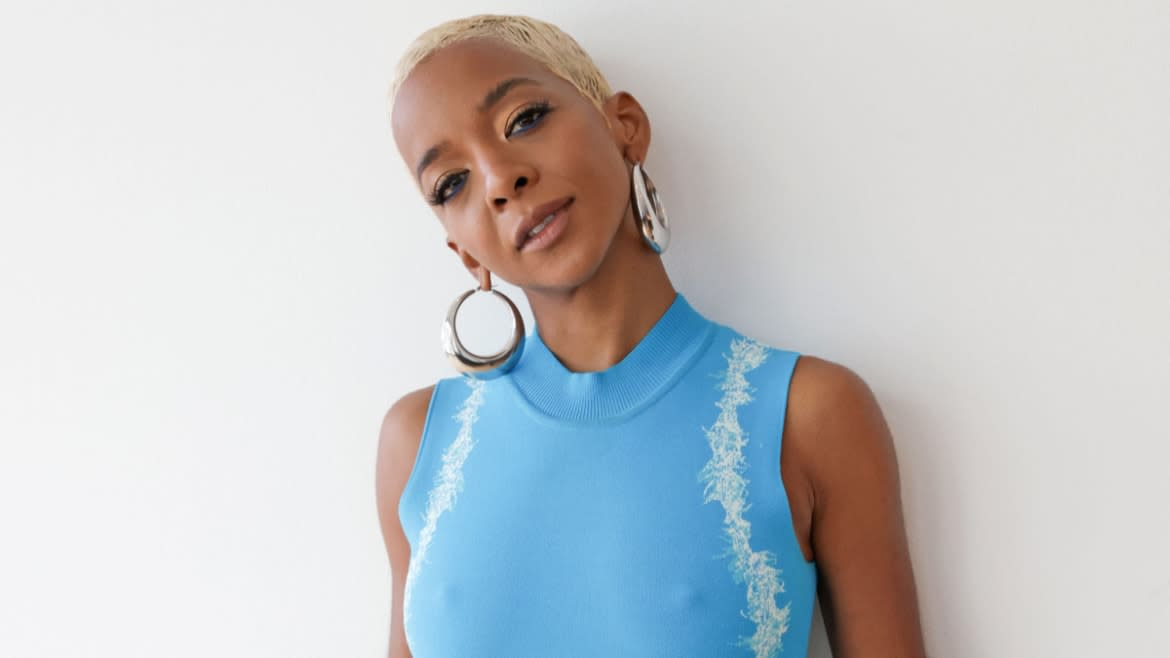
Some theater actors like to leave their characters behind at the stage door every night. But for Kara Young, the characters that have brought her much acclaim and applause on Broadway—and two-for-two Tony Award nominations (for Best Featured Actress in a Play)—stick around. Indeed, she insists that she continues to learn from them long after she has spoken their words and hung their costumes back on the dressing room rail.
“I think they’re there all the time,” she said of the people she has played to date. “I still get revelations about the characters all the time. They have all become part of me. I know that sounds corny, but it’s true.”
Review: ‘Purlie Victorious’ Skewers Racism With Passion—and Laughter
Young is back on Broadway—perhaps a third Tony nomination awaits, for Best Actress in a Play—playing Lutibelle in the revival of Ossie Davis’ 1961 play, Purlie Victorious (Music Box Theatre, to Feb 4), which brilliantly skewers the viciousness and absurdities of racism. (Young has also recently appeared on screen in I’m a Virgo, playing Jones, a queer communist activist, but she says she cannot talk about this, or screen roles more generally because of the ongoing actors’ strike.)
Audiences’ reactions to Lutibelle—who masquerades as a cousin of Leslie Odom Jr.’s character to help him reclaim his church—have been “overwhelmingly beautiful,” said Young. “I feel like whatever Ossie set out to do 62 years ago is happening in the Music Box Theatre every show. People are walking out really hopeful and filled with joy, and there’s something so magical about that.”
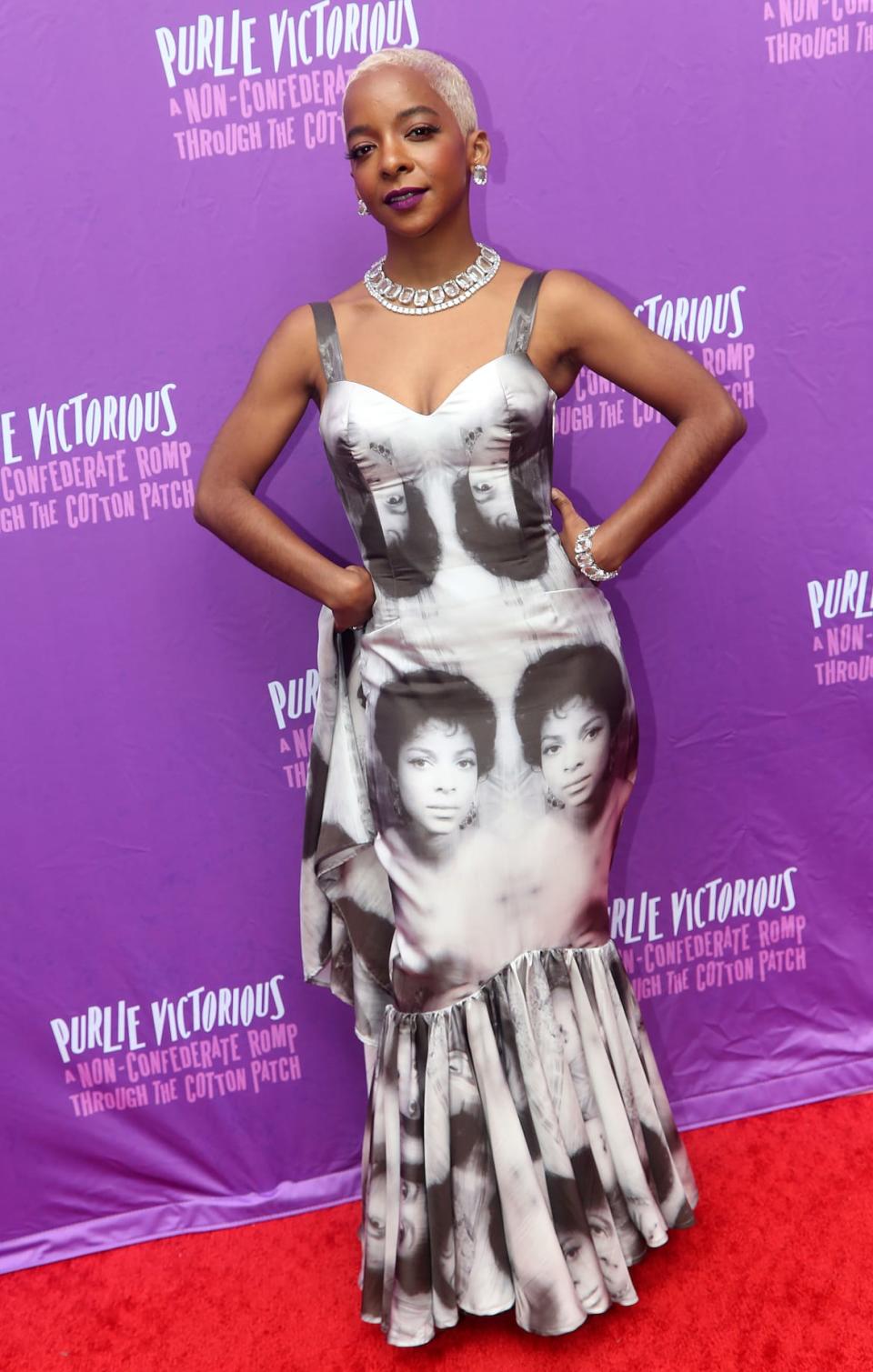
Kara Young, wearing a dress with Ruby Dee's face on it, at the opening night of 'Purlie Victorious' at The Music Box Theatre on September 27, 2023 in New York City.
Young was born and raised in Harlem, near where Ruby Dee—Davis’ wife, and the original Lutibelle—lived. At the opening night of Purlie Victorious, Young wore a dress, designed by her aunt, a seamstress, with Dee’s image printed on it.
“I look up to a lot of people, so many incredible Black icons that we wouldn’t be as actors—we wouldn’t exist—were it not for what they’ve done, Ossie and Ruby in particular as people who were so active in New York. Ruby had a hard life. For a long time, people have said to me that I remind them of Ruby—that I look like her and sound like her. We have so many commonalities. Being in Purlie Victorious is one of those kismet moments where I’m like, ‘This woman has paved the way for so many of us.’ They were just so involved—you can hear it in the play.”
“Ossie constructed a world where we are really dissecting the absurdities of the social and racial structures of this America we live in,” said Young, “and the overall absurd construction of racism, which is so brilliant. It feels not like a long time ago, because I honestly think we haven’t escaped a lot of those ideologies given the political temperature in our country, and the national and global divisions over the last eight years. Books are being burned in America, and history is being buried. Part of this play is about we can’t forget what happened.”
“I feel this is a very timeless play, despite being clearly set in a certain era,” Young continued. “For me, Lutibelle is taking a chance on life, the universality of that thing of leaving knowing what you know. Purlie is fighting to get back what is rightfully his. There’s so much universality in the characters’ stories in the play. They are about what it means to be human stepping out into the world, fighting for what you want, fighting for what you know you deserve, and fighting for what’s yours, and fighting to get your land back. There are just so many things that feel so present, current, and palpable. It’s a world we can dive into.”
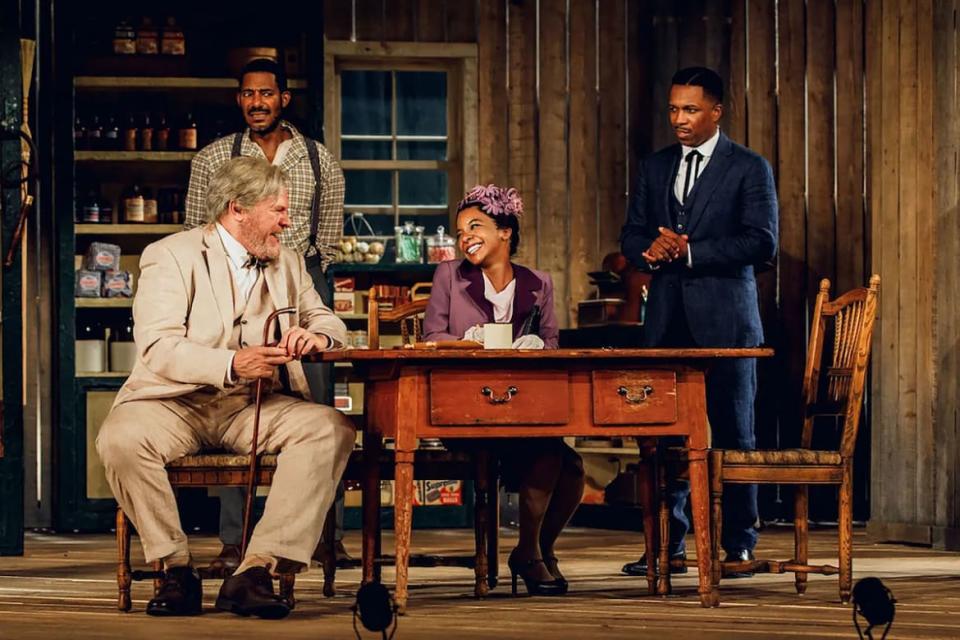
(l to r) Jay O. Sanders, Billy Eugene Jones, Kara Young, and Leslie Odom, Jr. in Ossie Davis’s 'Purlie Victorious.'
Young sees Lutibelle as a “fish out of water, where she does the scariest thing possible and leaves what she knows. I’ve never left New York. I was born and raised here. I’ve been to other places for work, but if I ever had to leave here I don’t know how I would be. But, as a Black vessel, a Black actor stepping into her shoes every night, it feels like an exploration of physical freedom and what it means as an act of pretending when she pretends to be Cousin Bee. What does it mean to and for Lutibelle?”
Young said it had been “beautiful” to hear markedly diverse audiences expressing their reactions to the play in real time. It was particularly gratifying for Young to appear alongside Odom Jr. on The View recently, with Whoopi Goldberg particularly emphatic that viewers should see the play. “It was something sitting next to her. I told her Cousin Bee was based on Oda Mae Brown in Ghost. If there’s somebody whose done it all, it’s Whoopi—theater, one-woman shows, she’s given us some of the most iconic films and TV and some of the most prolific fashion, she really steps outside the box as a fashion person. She is one of those people who has taught me, ‘Do not put me in a box. I can be anything.’ When she said that about our play, I was like, ‘Wow, Whoopi just gave us the stamp of approval!’ Whoopi is a multi-hyphenate as a human. She embodies the infiniteness of being an artist and being human.”
“It was so beautiful and perfect—you can’t make that up”
Young’s first Tony nomination came for her role in Lynn Nottage’s Clyde’s, in which she played Letitia, one of a group of former prisoners struggling to craft new lives for themselves. Of playing Jess, a Princeton grad working multiple jobs in Martyna Majok’s Pulitzer-winning play Cost of Living (securing her second nomination), Young said, “There’s so much humanity between every line and every thought and every heartbeat of that play. There’s so much there.”
Her first Tony nomination for Clyde’s was “so memorable” because of her father Klay Young serving at the nominees’ luncheon at the Rainbow Room (where he has worked since 1992)—his name announced from the stage alongside hers.
“It was so beautiful and perfect—you can’t make that up,” Kara recalled. “There are so many blessings out of those moments. There is still so much emotion attached to that event. My father is still buzzing from it.” She adores his cooking, relishing his baby lamp chops, Thai curries, and other dishes inspired by the people from all over the world he has worked alongside in the restaurant industry.
“I did not expect a Tony nomination for any of those performances,” Young insisted. “I really had no clue that that was going to happen. All the accolades have been surprises—especially being in the company of incredible actors and artists. It’s a privilege to step into their worlds, and they’re such important characters—women of color affected by the world, by capitalism, and the prison-industrial complex. They’re trying to survive in a very capitalistic society and the world is failing them truly. These are absorbing histories. I think that we’re forgetting our history, and it feels like such a gift to research and read excerpts every day. It feels like a gift to know it, and to seek the knowledge and understanding. That feels like the prize at the end of the day.”
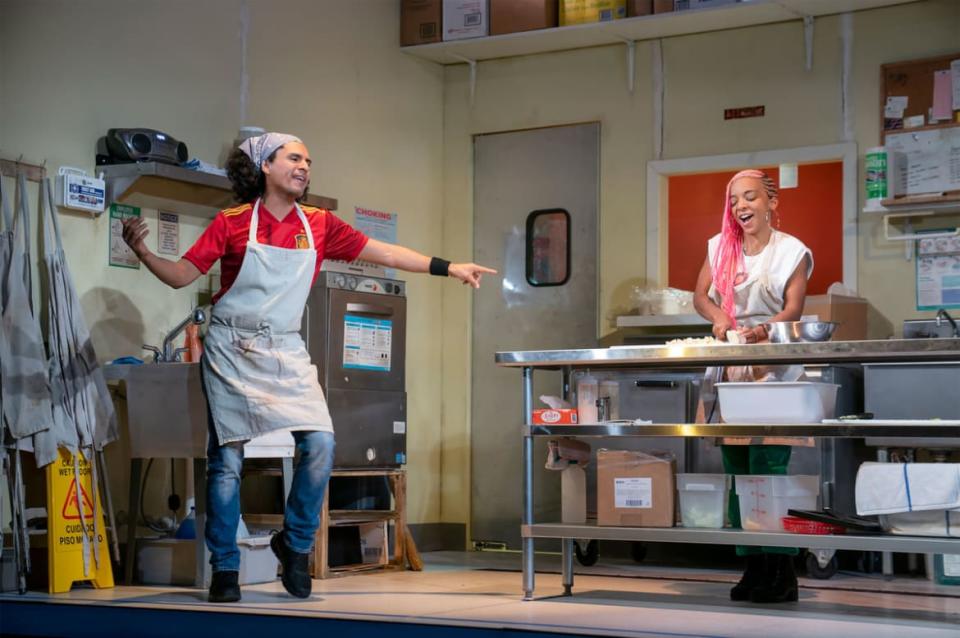
Reza Salazar, left, and Kara Young in 'Clyde's.'
Young thinks the work Broadway must do to confront racism and institute true equality on and off stage “is going to continue forever because racism is still real, and the whole world has been mis-educated and misdirected around it. We have had some beautiful productions recently. On Broadway this is our third season back from the pandemic. You have (playwright) Jocelyn Bioh and (director) Whitney White making their Broadway debuts with Jaja’s African Hair Braiding alongside very brilliant actors making their Broadway debuts. It’s an incredible play—I’ve never seen anything like that represented on stage. It’s so reminiscent of my Harlem, and the Harlem I grew up in, getting my hair braided in African hair braiding shops.”
Playing a character in something as “radical” as Purlie Victorious, 62 years after it was first performed, also feels “revolutionary” to her. For her, Davis’ play “feels like a monumental moment in time. I feel it in American theater too, sort of like a resurrection of spirit and hope. It feels right on time, and right what we need.”
“It felt really magical that I could make people feel something”
Young “fell in love” with performing, aged 5, taking a mime class her brother was in. At 12, she started participating in musical theater before going on to study at Gettysburg College: “I couldn’t sing to save my life, but I did it for a few years.” Improvising a scene about a drug addict mother and her daughter with a friend at a theater class (“the only other Black girl”), Young looked up, “and everyone was just bawling. Both of us went there. The audience was so moved. I was moved. It felt really magical that I could make people feel something. I was like, ‘Oh my god, I think this is what I am going to do for the rest of my life.’”
Her parents, proud of her success, were nervous when she first told them she wanted to be an actor. “They were like, ‘OK, well there’s this program where you can study to be a radiologist.’ Or: ‘Maybe you want a Plan B.’ My mom was always like, ‘You’d be a great speech pathologist.’” Young laughed. “I think they really are proud now. When I set out to do the thing, and I was able to support myself, they were OK with it.” Both she and her parents have learned “so much” from the roles she has played.
At the beginning of her career, there was “lots of study, readings, 10-minute play festivals, and lots of random performances doing plays in mosquito-infested basements. When I first started, my super-shallow brain had a very fixed idea of how I wanted to do things. Then reality struck. I realized I couldn’t be picky about things. I forgot my shallow desires.
“For a long time, I worked so many jobs while I was acting, in restaurants and offices. One day I said to myself, ‘OK, I’ve made this amount of money doing voiceover work. I’m ready to quit everything and focus on acting.’ And truly, the world opened up from that moment.”
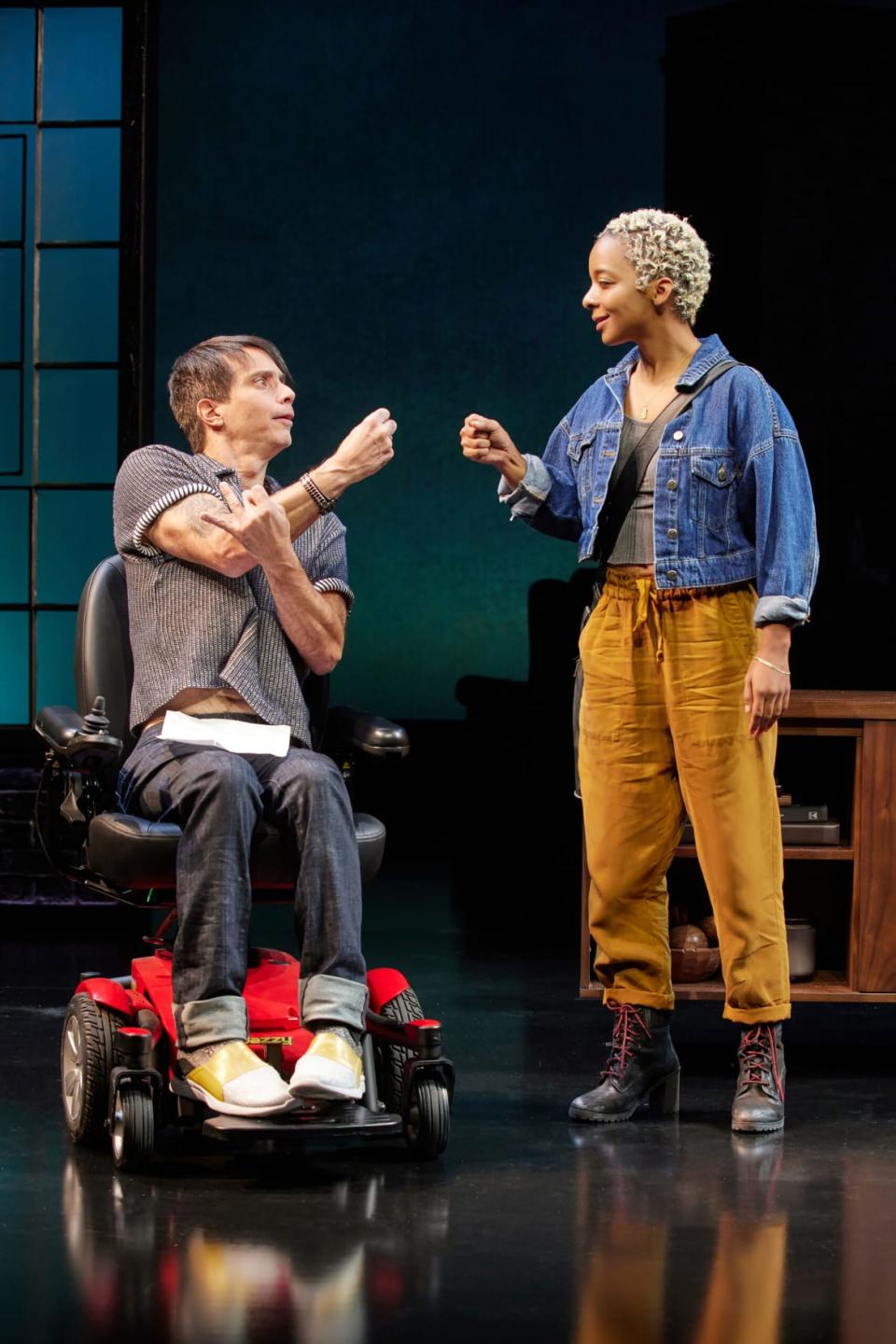
Gregg Mozgala, left, and Kara Young in 'Cost of Living.'
One of her favorite of those 10-minute plays was The Reoccurring Resurrection of Sweet Latisha Jesus Brown by Patricia Ione Lloyd, about a Black girl who kept on waking up from the dead. A huge fan of Lloyd’s work, Young also performed in Pretty Hunger at the Public Theater in 2016.
In 2017, Young joined LAByrinth Theater Company, “a beautiful group of people who encouraged the best out of the artist. And they love you no matter what. They’re just like the uncles and aunties pushing you to be your greatest self and dig into the deepest truth, and will also tell you when you’re not truthful. They not only encouraged me personally, but also to have pride in myself as an artist.”
There, Young performed in plays such as Stephen Adly Guirgis’ Halfway Bitches Go Straight To Heaven, Jeff Augustin's The New Englanders, and C.A. Johnson's All the Natalie Portmans. The latter brought her positive notices in the press. “You do wish for it, you do,” she recalled of seeing her performance complimented in print. “I would be silly to say I didn’t hope to be reviewed, and then at the same time, everyone was like, ‘Don’t read the reviews. Don’t let it skew your mind, or affect your work.’” She laughed.
Since Young’s Broadway success and Tony nominations, she said, “People are like, ‘How does it feel to be a Broadway star?’ I’m like, ‘I’m doing a play, a really important play.’” The same went for Clyde’s and Cost of Living, she said. “They all felt like they showed important shiftings of consciousness within humanity.”
Young is now a Broadway star—how had she embraced or made sense of that? “To answer 100 percent truthfully I don’t know if I have truly comprehended or have really understood the weight of it. Nor have I taken the time to take it in—and that’s my fault because I’ve just been working. But I also feel like as those moments have played out it’s very fleeting.”
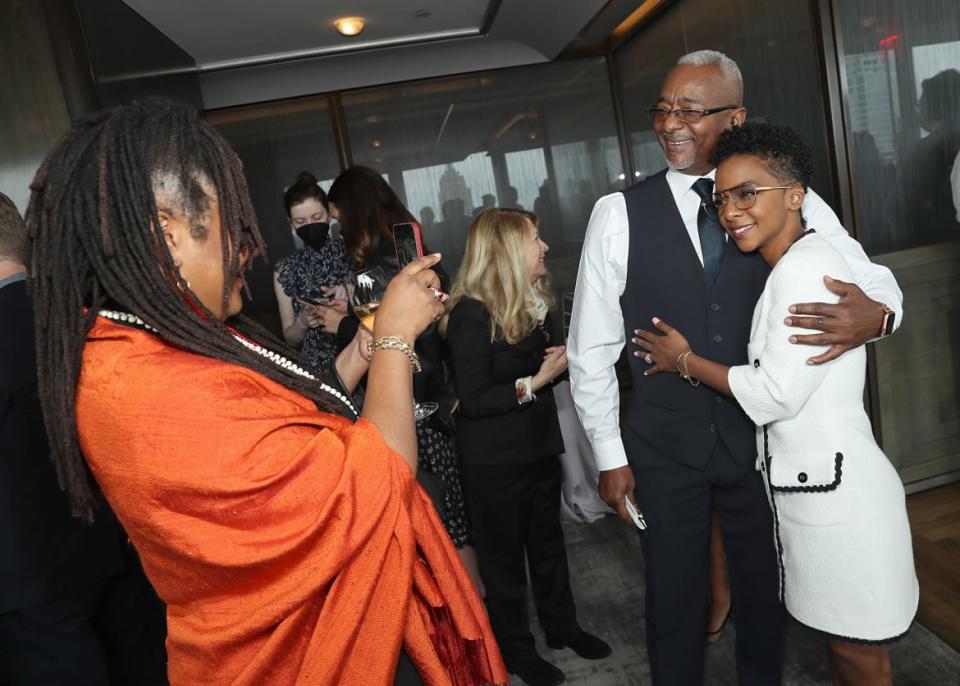
Lynn Nottage (l) and Kara Young (r), with her father, attend the 75th Annual Tony Awards Nominees' Luncheon at The Rainbow Room on May 24, 2022 in New York City.
The award nominations and fame have meant Young has been sent more plays to read, but, she says, she has always enjoyed reading plays as possible projects. She relishes the cold table read of a new play—“starting at zero”—with fellow cast members, and then the sometimes years-long process of workshopping a play to fully staged fruition. As her three Broadway plays to date show, Young gravitates to fellow artists “trying to change the world.”
Young says she has no notion of what her next play will be; she only hopes—like Purlie Victorious—it is “in the same vein of hope and revolution.” She has always wanted to work with Wes Anderson—“Of course, duh. The art and aesthetic of it all. I’m always looking to challenge and stretch myself, and do something I’ve never done before. Hopefully that will be the next thing. I’m crossing my fingers.” She would also like to direct herself, most likely for big or small screen.
Last year, Young won an Obie Award for her portrayal of Viola in Classical Theatre of Harlem’s Afrofuturist-themed production of Twelfth Night. “It’s free theater for the community,” Young said. “I was born and raised here, so it felt like a special moment—and it was also a special, vulnerable moment for me because it was the first Shakespeare I ever stepped into. I had played a fairy in Titania’s service before, but not in terms of immersing myself in a whole world and language. All of it was very new for me.
“Also, that play is about skipping the gender roles of life, and people falling in love with people. I thought Illyria was such a fun, whimsical, chaotic world. It was really special to do that outdoors for people. There are so many homeless people in that park they got to see the play. There’s something about that, man.”
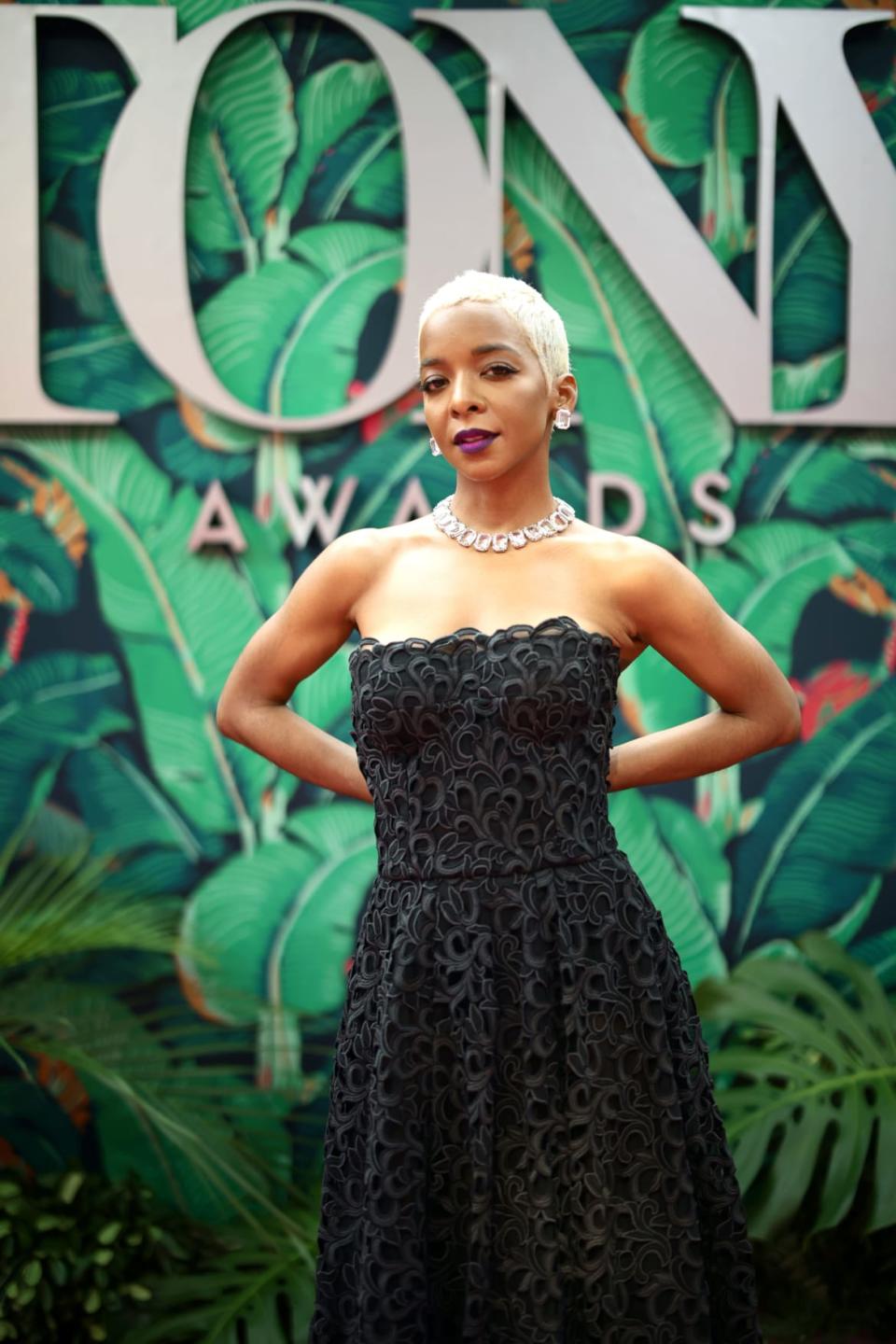
Kara Young attends The 76th Annual Tony Awards at United Palace Theater on June 11, 2023 in New York City.
It is “very important” to Young that she still lives in Harlem; her parents live 20 blocks south of her. “There’s still a community here. But at the same time, I do feel like we are fighting to be here.”
Does she mean the forces of gentrification? “Absolutely. There have been a lot of changes in our businesses—buying a bagel and coffee can cost 14 dollars—and in the community, and what it means to walk down the block, or enter our buildings, our stoops, what it means to continue to be part of our world, what it means to say, ‘Good morning,’ ‘Good afternoon,’ and ‘Good night’ and be met with no response. Those are the changes that we are going through as people still here.”
Young has been with her “incredible” partner, the actor, painter, playwright, and comic Biko Eisen-Martin, for six years. “A lot of inspiration comes from our conversations,” she said. “We’re in constant conversation.” She wants a dog “so bad”—perhaps a dachshund or chihuahua. Relaxing more generally is hard in New York, she said, with always so much to see and do.
Truly, her work is relaxing for her, Young insisted. Indeed, Purlie Victorious “feels like a healing taking place inside myself because I’m learning about so much, and it is almost as if the act of performing and the act of doing this play is a really beautiful offering to a generous audience. It feels as if the work is both the relaxation and the most important purpose of getting up every day.”
Get the Daily Beast's biggest scoops and scandals delivered right to your inbox. Sign up now.
Stay informed and gain unlimited access to the Daily Beast's unmatched reporting. Subscribe now.
